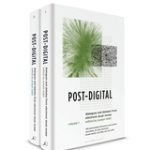electropoetics
Constructing the Other Half of The Policeman’s Beard

Leah Henrickson explores the contexts surrounding the publication of The Policeman's Beard is Half Constructed, advertised as “the first book ever written by a computer” at the time of its release in 1984. Drawing from contemporary reviews, personal correspondence with the book’s creators, and analysis of the book itself, Henrickson offers insight into precisely how this book was produced, and by whom. Although a computer program called Racter is listed as the author of The Policeman’s Beard, this attribution does not accurately reflect the human labor driving the book’s development and dissemination. This essay illuminates these networks of human labour that ultimately led to Racter and The Policeman's Beard.
Post-Digital Debates and Dialogues from the electronic book review

The lively dialogue among the contributing authors, ebr’s longest-serving and newly appointed editors, and the engaged and interested audience, which accompanied the Post-Digital / Dialogues and Debates book launch in September 2020, is an interesting insight into the recent debates on the multifaceted ramifications of digital disruption and the ways in which it has transformed our society, culture, and aesthetics. The discussion throws some light as well on the always fascinating history of the early electronic literature initiatives which had laid the groundwork for what eventually turned out to become the whole new field of intermedia literary practice and the sub-discipline of trans- and interdisciplinary academic inquiry. The authors of the mammoth 2-volume anthology recruit from the variety of contexts and offer diverse looks at the post-digital condition of our contemporaneity.
Reconfiguring Flatness on Screen: A Short History of Cover Designs for Chinese Web Novels

Renren Yang insightfully reveals the rarely (if ever) explored domain of cover designs for Chinese Web novels. Tracing their evolution from a print format that enables the tactile and sensual pleasures of opening the actual book to its supposedly more immaterial digital incarnation, Yang reimagines the very idea of a book cover in the digital age. This closer look reveals how serialized novels’ cover design frames the reader's experience, demonstrating as well the fact that the already well established periodization of the First, Second, and Third Generation e-literature are culturally and geographically specific, and dependent on the local histories of computing technology beyond Euro-American context. Analyzing the conceptual tension and fusion between book cover as a “mixed medium” and digital cover as “intermedium,” and drawing upon Chinese pictorial tradition, Yang defines the ontology of the digital book cover as an attempt at reconfiguring “flatness” on the digital screen.
Literature and its digital and computational others

In this riPOSTe-turned-essay, John Cayley reflects on “the perpetual problem of terminology” in the field of electronic literature.
“the many gods of Mile End”: CanLit Print-Culture Nostalgia and J.R. Carpenter’s Entre Ville

Carl Watts argues that J.R. Carpenter’s Entre Ville constructs Canadian literature as a unified, holistically understood entity that is both broadly accessible and fleetingly familiar. In so doing, Carpenter’s work aligns representations of Montréal with uses of new media, with the cross-cutting and mutually exclusive identities of the former mirrored in new-media poetry’s partial or conditional embrace of the formal possibilities of digital poetry.